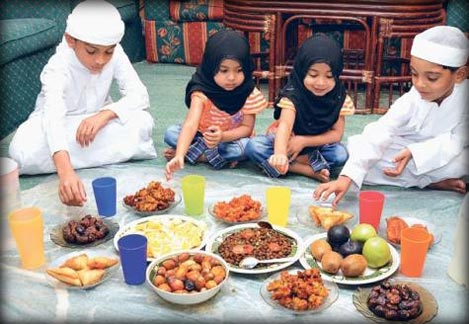|
 Ramazan
: Ramazan
:
A month long spiritual journey
by Husna Inayathullah
Muslims around the world shifted
gear to a slower, spiritual level on Friday, as they welcomed the
blessed month of Ramazan and began the month long period of fasting.
One of the five pillars of Islam,
fasting during this period is not simply about abstaining from food and
water for 14 hours or so a day, but is a month long spiritual journey
that helps purify the souls, refocus attention on God and practice self
sacrifice.
The essence of fasting is aptly
contained in the Arabic term Sawm, which literally means ‘to refrain’,
not just from food and drink but in actions, thoughts, words and deeds
as well.
Ramazan is the ninth month in the Islamic calendar, and is
significant also because it was during this month that the first
revelation of the Quran was made to Prophet Mohammad. Fasting in the
month of Ramazan was made obligatory during the month of Sha’aban in the
second year after the Muslims migrated from Mecca to Medina. The month
lasts for 29 to 30 days based on the sighting of the crescent moon.
The word Ramazan, also spelt Ramadan, comes from the Arabic root
ramida or ar-ramad, which means scorching heat or dryness. Fasting is
obligatory for adult Muslims except for those who are ill, travelling,
the elderly, pregnant, breastfeeding or menstruating. However, they are
expected to make up for the missed fast days sometime in the future or
help feed the poor.
While fasting from dawn to sunset, Muslims refrain from consuming
food, drinking liquids, smoking and engaging in sexual intercourse.
Muslims also refrain from other behaviour that could be perceived as
sinful such as swearing, engaging in disagreements, backbiting and
procrastination.
Suhoor and iftar
 Two
main meals are served during Ramazan, the suhoor, which is served before
dawn and iftar which is served after sunset. Suhoor helps a Muslim to
fast and stay active and fit throughout the day. Two
main meals are served during Ramazan, the suhoor, which is served before
dawn and iftar which is served after sunset. Suhoor helps a Muslim to
fast and stay active and fit throughout the day.
So, usually Muslims around the world take a heavy and a hearty meal
for suhoor, with fruits, milk and dates. Muslims keep the intention to
fast after suhoor before the sun rises or the morning prayers begin,
which marks the end of the suhoor time.
Each day’s fast is broken with a meal known as ‘iftar’.
Traditionally, the fast is broken with dates and water. Iftar is often
an elaborate feasts celebrated with family and friends.
It is intriguing how Muslims all over the world sit cross-legged on
the floor in mosques and at homes, waiting in hunger, fatigue and
spirituality for the Azan, the call of prayers, to break their fast.
Muslims can continue eating and drinking throughout the night until the
next day’s suhoor.
Both of the suhoor and iftar meals contain fresh fruits, vegetables,
halal meats, breads, cheese, and sweets. The Muslim world is large and
is not constrained to the Middle East. There are Muslims worldwide in
Europe, North America, Asia, Africa, and Australia. The types of food
served vary by region. The meals are served either at home with family,
in the community mosques or other designated places within the Muslim
community.
Charity becomes very much important especially during the Ramazan
period. The Arabic term Zakath, which means ‘poor-rate’ is one of the
pillars of Islam and it is obligatory upon all Muslims who have the
means, to give a fixed percentage of their income/savings to the poor
during this month.
Special Prayers
|
I hope I can fast all 30
 Mohammed
Ahsan – student, 13-years “I started to fast when I was just
five years old but I broke fast in the afternoon. I couldn’t
fast the whole day. I felt like fasting just because
everyone at home did. My mother used to narrate a story
about a poor boy long ago, who fasted and died, but again
got life through an angel due to the blessings of Allah. My
mother’s stories also made me fast. I like to fast but
sometimes I feel tired. Now sometimes I feel that leaving a
fast in this month is alright that’s when I feel tired. I
hope this year I can fast well and all 30 days. Anyway I
love Ramazan as it is one of the five pillars of Islam. Mohammed
Ahsan – student, 13-years “I started to fast when I was just
five years old but I broke fast in the afternoon. I couldn’t
fast the whole day. I felt like fasting just because
everyone at home did. My mother used to narrate a story
about a poor boy long ago, who fasted and died, but again
got life through an angel due to the blessings of Allah. My
mother’s stories also made me fast. I like to fast but
sometimes I feel tired. Now sometimes I feel that leaving a
fast in this month is alright that’s when I feel tired. I
hope this year I can fast well and all 30 days. Anyway I
love Ramazan as it is one of the five pillars of Islam.
|
|
Fasting makes me feel
good
 Imran
Mohammed – Software Engineer “People think it is impossible
to fast while working but that is wrong. We can fast while
working if we have strong faith in God. Fasting has a lot of
health benefits too. I love fasting because it makes me feel
good. Fasting for 30 days and waiting eagerly for the
festival is cool. I love purchasing new clothes to wear to
the mosque on festival day. Going to the mosque early in the
morning to pray festival prayers is exciting. Meeting
friends and greeting them is also cool.” Imran
Mohammed – Software Engineer “People think it is impossible
to fast while working but that is wrong. We can fast while
working if we have strong faith in God. Fasting has a lot of
health benefits too. I love fasting because it makes me feel
good. Fasting for 30 days and waiting eagerly for the
festival is cool. I love purchasing new clothes to wear to
the mosque on festival day. Going to the mosque early in the
morning to pray festival prayers is exciting. Meeting
friends and greeting them is also cool.” |
Tarawih prayers are extra prayers performed by Muslims at night
during the month of Ramazan. They are not compulsory prayers but Muslims
believe they can gain a lot of merit by observing these prayers,
conducted at the mosque for the duration of Ramazan. Whole section of
the Quran is recited during these prayers, ensuring that the entire
Quran is completed when the month of fasting ends. Incidentally, tarawih
prayers are one of the few exceptions where Muslim women are
accommodated in the mosque.
The spiritual significance of the month reaches its pinnacle on the
night of the 27th day of fasting, the night on which, Muslims believe
the first revelation of the Quran was sent to Prophet Mohammed. Referred
to as Laylatul Qadr, which means ‘the night of power’, it is considered
the holiest night of the year.
There is some ambiguity about the exact night on the Quran was first
revealed, with the Muslims believing it to have occurred on an odd
numbered night during the last ten days of Ramazan.
But as a general consensus, the 27th night is accepted as spiritually
special with a majority of the Muslims engage in spiritual activities
throughout the night to receive the mercy of God.
Festival
Eid-ul-Fitr, which means ‘the festivity of breaking fast’ marks the
end of Ramazan and the beginning of the next lunar month, known as
shawwal. The first day of the month is declared after another crescent
new moon is sighted. The Muslims are very excited to see the new moon to
begin celebrating the festival. Eid al-Fitr is also the festive nature
of having endured the month of fasting successfully and returning to the
normal routine of everyday living. Muslims greet each other by saying
Eid Mubarak.
Fasting is a good practice if properly observed and has many health
benefits including helping promote healthy eating habits and boosting
immunity. Fasting also helps promote detoxification, give some respite
to digestive system, resolve inflammatory responses, reduce blood sugar,
increase fat breakdown, correct high blood pressure, control diabetes,
promote weight loss and overcome addictions.
Ramazan is….
A cross section of Muslims explain
what this holy month means to them |
 More
spiritual More
spiritual
Uzilifa
Jamaldeen – Housewife “As a
mother I’m very happy to see the behaviour and the good
practices of my children during this month. Children are
more disciplined and they control themselves. I am happy to
see children reciting the Quran, praying at the correct
times and engaging in many more spiritual activities. The
problems in the family vanish due to the blessings of
Allah.” |
Can earn lots of merit
 Naashir
Nizar- Senior Executive “Allah has given everyone a
chance to find forgiveness in the month of Ramazan. Fasting
help us experience the hunger faced by the poor people and
beggars. I always feel and realize how people suffer without
food and water. Ramazan is the month where we can add lots
of good deeds to ourselves. I feel lazy to wake up for
suhoor, but I do wake up for fasting. No matter how much I
eat for suhoor, I still feel hungry. What I do is keep
reciting the Quran. When I fast, I feel hungry, but while
fasting when I give someone Zakath from my hand and when
they feel happy, it really fills my heart. I’m happy that
I’m able to help someone.” Naashir
Nizar- Senior Executive “Allah has given everyone a
chance to find forgiveness in the month of Ramazan. Fasting
help us experience the hunger faced by the poor people and
beggars. I always feel and realize how people suffer without
food and water. Ramazan is the month where we can add lots
of good deeds to ourselves. I feel lazy to wake up for
suhoor, but I do wake up for fasting. No matter how much I
eat for suhoor, I still feel hungry. What I do is keep
reciting the Quran. When I fast, I feel hungry, but while
fasting when I give someone Zakath from my hand and when
they feel happy, it really fills my heart. I’m happy that
I’m able to help someone.” |
 Cleanses
the soul Cleanses
the soul
Razeen Aman – Consultant
“I am happy to fast and Ramazan is a month I wait for. I
love this month as it helps me to cleanse the soul, focus
attention on God and put myself into selflessness. It is the
month where the Holy Quran was revealed. There is a night
called ‘Lailathul Qadr’, which wipes off a believing
Muslim’s sins and I am eagerly waiting for that night. I
want to achieve the blessings of Allah this Ramazan.”
|
Share the feel of hunger
 Althaf
Ahamed – Sales Executive “We live 365 days in a
year. During the month of Ramazan we fast for just 30 days
to feel the hunger felt by the poor. Today, thousands of
people die in the word due to hunger. God has blessed us
with a better life and demanded us to feel the hunger of the
poor for just a month. I am happy about it and I want to be
honest and perfect in my fasting.” Althaf
Ahamed – Sales Executive “We live 365 days in a
year. During the month of Ramazan we fast for just 30 days
to feel the hunger felt by the poor. Today, thousands of
people die in the word due to hunger. God has blessed us
with a better life and demanded us to feel the hunger of the
poor for just a month. I am happy about it and I want to be
honest and perfect in my fasting.” |
 We
get closer to God We
get closer to God
Murshida Inayathullah –
Teacher “I wait for the month of Ramazan eagerly as
these 30 days keep us away from the materialistic world and
bring us closer to Almighty Allah. We get closer to God, by
moving away from the pleasures of the world. This definitely
makes people calm and brings peace to one’s mind.”
|
|

